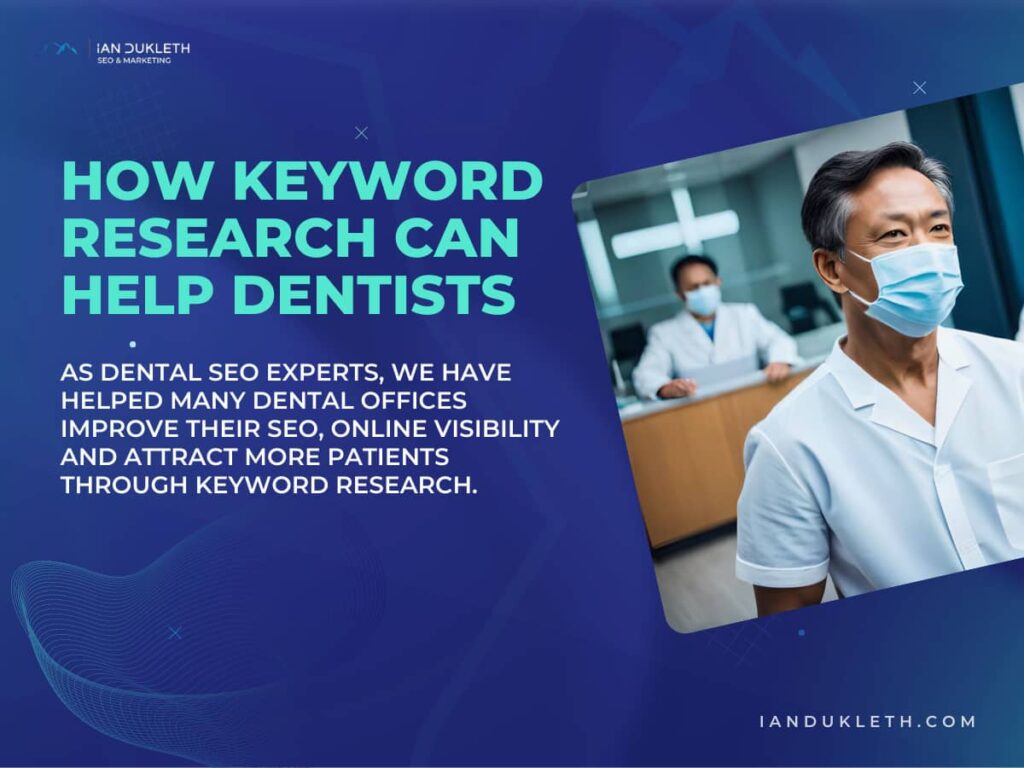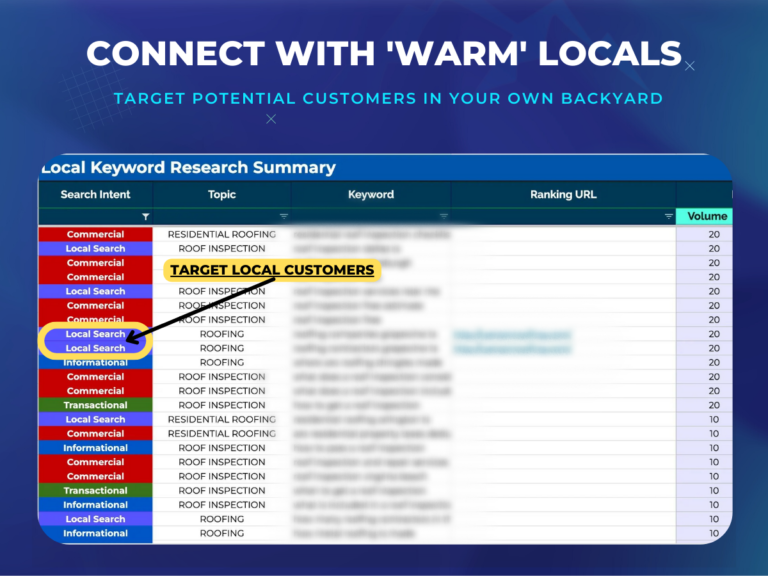How To Implement The Best SEO For Dentists Through Keyword Research
As a dental professional, you understand the importance of attracting new patients to your practice or dentist’s office. With the bulk of patients searching for dental services online, it is vital to have a strong online presence (social media, website, and search engine business listings). This is where SEO (search engine optimization) for dentists comes into play.

Why Keyword Research is Essential for Dentist Offices
By optimizing your website for search engines, you can improve your dentistry’s exposure and attract more patients to your practice.
Keyword research is a crucial aspect of dental SEO that can help dentists attract more patients to their practice. By identifying the most relevant and profitable keywords for your practice and incorporating them into your website content, dentists can improve their visibility in search engine results pages and attract more patients.
As dental SEO experts, we have helped many dental offices improve their SEO, online visibility and attract more patients through keyword research. Here are some of the benefits of keyword research for dental practices.
Table of Contents
The Benefits of Keyword Research for Dental Practices
Keyword research is an essential part of any dental SEO strategy. Here are some of the key benefits of keyword research for dental practices:

Identifying the Most Relevant and Profitable Keywords for Your Practice
Keyword research allows dentists to identify the most relevant and profitable keywords for their practice. By researching the keywords that potential patients are using to search for dental services, dentists can optimize their website content to target those keywords and attract more traffic to their website.
Understanding ‘Search Intent’ to Create Hyper-Targeted Content
In addition to identifying relevant keywords, keyword research also allows dentists to understand the intent behind each keyword. By understanding the intent of a search query, dentists can create more targeted and relevant content that meets the needs of potential patients.
For example, if a patient is searching for “emergency dental care,” they may be looking for immediate help with a dental emergency. By creating content that addresses their immediate needs, dentists can better attract patients and establish themselves as reliable resource for emergency dental care.
Analyzing the Competition to Identify Opportunities and Gaps in the Market
Keyword research also allows your dental practice to analyze the competition and identify opportunities and content gaps in the market. By researching the keywords that your competitors are targeting, dentists can identify areas where they can differentiate themselves.
For example, if a dentist notices that their competitors are not targeting a particular service, such as ‘teeth whitening’, they can create SEO-focused content targeting that service to attract more patients and get ahead of the competition.
Optimizing Your Website Content to Increase Visibility on Search Engines
By incorporating relevant keywords into your website content, on-page optimization for dentists can improve their visibility in search engines. Leading to more organic traffic to your website, google business profile, and ultimately leveraging SEO for dentists to attract more patients to your dentist’s office. However, it is important to incorporate keywords naturally and avoid “keyword stuffing,” which can result in a penalty from search engines.
In addition to targeting dental keywords, it is also influential to incorporate location-based keywords to improve local SEO (or increase the visibility of your Google business profile listing). As patients often search for dental services near their location, dentists can incorporate location-based keywords in their website content, meta descriptions, and page titles to improve their visibility in local search results.
For example, as an SEO agency for dentists, we help implement SEO for dentists at a nearby dental practice in Dallas, TX incorporating location-based keywords into their website content. By targeting keywords such as “dental services in Dallas” and “best dentist in Frisco,” the dentistry was able to 2X their local SEO efforts and attract more patients in their area.

How to Conduct Keyword Research for Dental Practices
Now that you understand the benefits of keyword research for dental practices, let’s take a closer look at how to conduct keyword research for your dentist office or practice.
Brainstorm Relevant Topics and Services
The first step in conducting keyword research is to brainstorm relevant topics and services. Think about the dental services your practice offers, as well as any questions or concerns any potential patients may have. These findings can be used as a foundation for your keyword research.
Use Keyword Research Tools to Generate a List of Potential Keywords
Once you have a list of topics and services, you can use keyword research tools to generate a list of potential keywords. There are several keyword research tools available, some of our favorites: are Ahrefs and SEMrush. These tools can help you identify popular keywords related to your topics and services, as well as understand the search volume [how popular a keyword or search query is] and the amount of competition for that keyword.
Diagnose Search Volume, Competition, and Relevance to Identify the Best Keywords for Your Practice
Once you have a list of potential keywords, it is important to analyze your search volume, competition, and relevance to your practice. Look first, for keywords with high search volume and little to no competition, as these are typically the easiest to rank for. However, we also like to have a balance and find keywords with very high volume and a little more difficult to rank for. Lastly, make sure to choose keywords that are relevant to your practice and the services that you offer.
Use the Keywords to Create Optimized Website Content
Use the keywords you have identified to create SEO optimized website content. Incorporate the keywords naturally into your website content: headers, text, navigation, and more.
Incorporating Long-Tail Keywords for Dentists
Long-tail keywords are longer and more specific phrases that potential patients may use when searching for dental services. By incorporating long-tail keywords into your website content, dentists can attract more targeted and specific traffic to your website. Long-tail keywords are also less competitive and can be easier to rank for than short-tail keywords.
For example, as an SEO agency for orthodontists and dentists, we have helped dental practices target long-tail keywords such as ‘emergency dental care for kids’ and ‘affordable teeth whitening in Dallas.’
What Are Long-Tail Keywords?
Long-tail keywords are keyword phrases that are longer and more specific than broad keywords. For example, instead of targeting the broad keyword ‘dental services,’ a dentist could target a long-tail keyword like ‘emergency dental services in [city name]’ or ‘affordable orthodontic services for adults.’
The Benefits of Long-Tail Keywords for Dental SEO
Using long-tail keywords in dental SEO has several benefits:
Attracting Better Qualified Customers
Long-tail keywords help dentists attract more qualified traffic to their website because they target people who are searching for specific dental services or treatments. This means that people who find the website through long-tail keywords are more likely to be interested in the services offered.
Reducing Competition
Long-tail keywords have less competition than broad keywords, which makes it easier for dentists to rank higher in search engine results pages (SERPs) and attract more traffic to your website.
Boosting Your Website’s Click-Through Rates
Long-tail keywords often have a higher click-through rate than broad keywords because they are more specific and relevant to the user’s search query.
Location-Based Keywords for Dentists
Location-based keywords are keywords that include the name of the city, town, or region where your dental practice is located or that you would like to target more customers. Using location-based keywords in dental SEO is crucial for attracting local patients and improving the practice’s visibility in local search results or ending up in Google’s ‘local map pack’.

The Importance of Location-Based Keywords for Local Dental SEO
Using location-based keywords in dental SEO has several benefits for local practices:
Attracting Local Patients
Location-based keywords help dentists attract patients who are searching for dental services in their nearby area. This is particularly important for practices that rely on local patients for their business.
Improving Your Local Search Rankings
Google and other search engines use location-based keywords to determine the relevance of a website to a specific location. By using location-based keywords, dentists can improve their local search rankings and appear higher in local search results.
Set Your Dental Practice Apart from Competitors
By using location-based keywords, dentists can differentiate their practice from competitors who may not be targeting local keywords.
How to Incorporate Location-Based Keywords
Here are some steps dentists can take to incorporate location-based keywords in their dental SEO strategy:
Identify relevant location-based keywords: Dentists can start by identifying relevant location-based keywords for their practice, such as ‘dentist in [city name]’ or ‘orthodontist near [zip code].’
Including Location-Based Keywords for Local SEO
In addition to targeting dental keywords, it is also important to incorporate location-based keywords to improve local SEO. Local SEO is crucial for dental practices as patients often search for dental services near their location. Dentists can incorporate location-based keywords in their website content, meta descriptions, and page titles to improve their visibility in local search results.
Here are some examples of location-based keywords that dentists can use:
- Dental services in [city]
- Best dentist in [city]
- Affordable dental care in [city]
- Family dentist in [city]
Keyword Research for Dentist’s Wrap-Up
At our dental SEO agency, we pride ourselves on staying up-to-date with the latest SEO trends and techniques. We understand that SEO can be a complex and constantly evolving field, but we believe that by staying informed and continually testing and refining our strategies, we can provide our clients with the best possible results.
To reiterate, keyword research is an essential part of our successful dental SEO services and strategy. By identifying the most relevant and profitable keywords for your practice and incorporating them into your website content, you can rank your business higher in search engines and attract more qualified leads to your website.
As dental SEO experts, We highly recommend that all dental practices invest in keyword research and ongoing on-page SEO optimization to improve their online visibility and attract more patients.
If you feel like you already have enough on your plate, we can do the keyword research for your dental office, or practice.